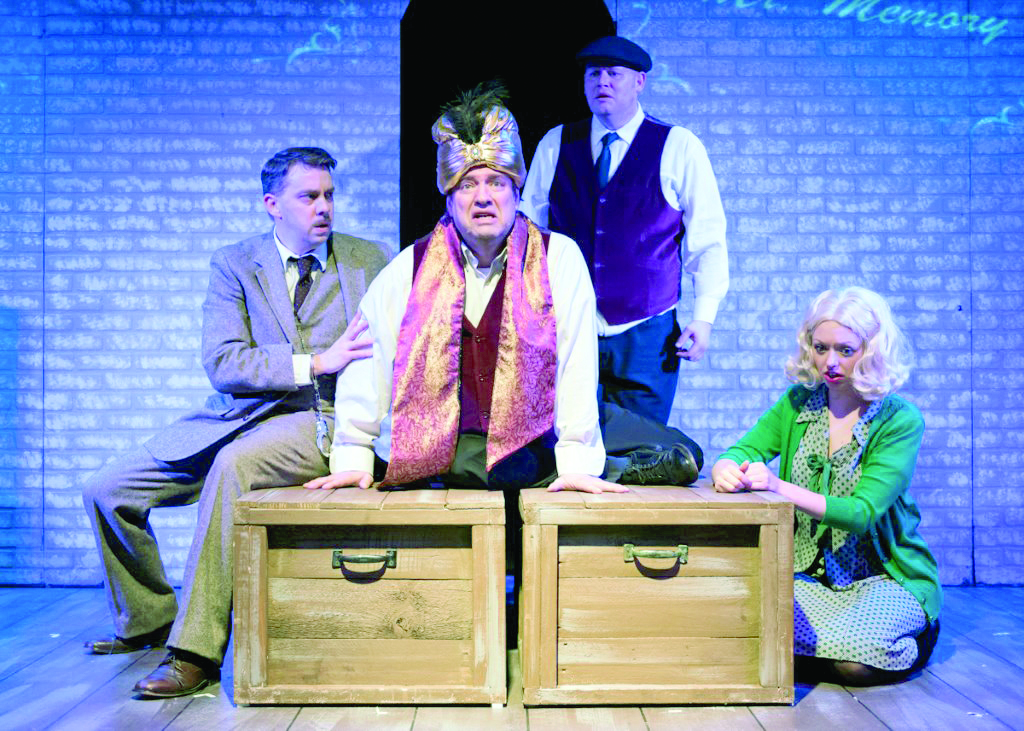Critic Bob Abelman presents Northeast Ohio theater companies with his annual year-end awards
By Bob Abelman
Every year, local professional theater companies devote themselves to putting on the best shows possible. Although some companies have deeper pockets, more Actors’ Equity contracts or a grander facility than others, talent makes itself known and creativity always rises to the surface no matter the pay scale or venue.
The Cleveland Jewish News wishes to recognize excellent productions and performances from the past year. As reflected in the breadth of this year’s award recipients, there is no shortage of either across our many local stages.
Only those professional productions originating in or staged by local troupes in the greater Cleveland/Akron area and seen by this reviewer are taken into consideration. Most performances were reviewed during their opening weekend.

PHOTO | Erik Johnson
Best Drama: “Three Sisters,” Mamaí Theatre
In Anton Chekhov’s 1901 drama “Three Sisters,” Olga (Natalie Green), Masha (Anjanette Hall) and Irina (Meghan Grover) live in quiet desperation in a provincial Russian town where they entertain locally stationed soldiers and dream of Moscow. Director Bernadette Clemens found all the inescapably dark, often very funny and always heartfelt moments in this four-act, three-hour masterwork. Because it was all placed within Don McBride’s minimalistic set within the cavernous confines of the Cleveland Masonic Performing Arts Center, there was nothing to distract the audience from the marvelous 17-person ensemble or detract from the play’s signature and finely honed melancholy.

PHOTO | Steve Wagner Photography
Best Comedy: “Superior Donuts,” Dobama Theatre
Tracy Lett’s play could be a TV sitcom. It revolves around a middle-aged draft dodger named Arthur (Joel Hammer) who is estranged from his family, emotionally detached from the world, and the sole proprietor of a rundown doughnut shop in a broken-down part of Chicago. Enter Franco (Robert Hunter), a 21-year-old dropout and dreamer who is looking for work. While it seems that Arthur is doing this young man a favor by handing him an apron, it is Franco who is doing the favor by taking it. Director Nathan Motta rose above the temptation to stage this for the small screen and mined the material for something deeper, more moving and significantly more beautiful. In fact, everything that was formulaic on paper was raised and glazed in this production. “Superior Donuts” was a sweet, tender, joyous celebration of the human spirit.

PHOTO | Roger Mastroianni
Best Musical: “The Secret Garden,” Great Lakes Theater
An enchanting adaptation of the classic children’s novel by Frances Hodgson Burnett, “The Secret Garden” follows the adventures of a defiant 10-year-old (Giovanna A. Layne) after she is returned to Yorkshire, England from India to live with her reclusive uncle (Stephen Mitchell Brown) at his neglected estate. This acclaimed musical, with book and lyrics by Marsha Norman and music by Lucy Simon, premiered on Broadway in 1991 and has been given several strong stagings in Cleveland over the years. None were as emotionally engaging as this one, thanks to Victoria Bussert’s velvet-gloved direction, Joel Mercier’s superb musical direction, and an absolutely stellar cast and design crew. Listen. Audiences are weeping still.

PHOTO | Roger Mastroianni
Best Director of a Drama: Laura Kepley, “The Crucible,” Cleveland Play House
In 1692, the farmer Giles Corey was accused of witchcraft along with his wife and other townspeople in Salem, Massachusetts. After his arrest, Corey refused to plead guilty and was subjected to a public pressing, where heavy stones were placed upon his naked body to coerce a confession. In a remarkable final act of defiance, the elderly Corey cried out and demanded “more weight.” In Cleveland Play House’s powerful and thoroughly engaging production of Arthur Miller’s “The Crucible,” which dramatizes the events that led to Corey’s torture and the execution of his neighbors, director Laura Kepley seems to have shouted “more weight” to those under her charge. Every performance and production choice helped make this play, written in 1953, relevant, resonant and absolutely riveting.

PHOTO | Roger Mastroianni
Best Director of a Comedy: Stephen Wadsworth, “A Comedy of Tenors,” Cleveland Play House
Ken Ludwig’s “A Comedy of Tenors,” which received its world premiere production during Cleveland Play House’s centennial season, is the sequel to his Tony Award-winning farce “Lend Me a Tenor.” This time around the characters find themselves in a room at a five-star hotel in Paris in 1936 to stage the concert of the century with the world’s greatest opera sensations on the bill. One hotel room with multiple doors for slamming. Four temperamental tenors with assorted wives and lovers. What could possibly go wrong? Well, everything. And it does so with meticulous precision, impeccable comic timing and impressive operatic sensibilities. Credit director Stephen Wadsworth, who is well schooled in merging high and commercial art as well as interweaving classical music with comedy. He raised farce to a higher art form.

PHOTO | Patrick R. Murphy / PRM Digital Productions
Best Director of a Musical: Scott Spence, “American Idiot,” Beck Center for the Arts
The Beck Center’s season was dominated by family fare, including “Forever Plaid” and “Mary Poppins.” But wedged into its schedule was the 90-minute punk rock opera, “American Idiot.” With music by Green Day front man Billie Joe Armstrong and Broadway and Metropolitan Opera veteran Michael Mayer, the show was a triumphant, full-frontal assault on the senses. Director Scott Spence, along with music director Bryan Bird, masterfully captured the loss of innocence and hope that pervades this play, pulled together intriguing design elements to create the perfect urban decay in which to house it, and found Dan Folino, Olivia Kaufmann and Joseph Virgo for roles they were born for.

PHOTO | Bob Christy
Best Musical Director: Jonathan Swoboda, “A Little Night Music,” Porthouse Theatre
Most everyone knows “Send in the Clowns,” Stephen Sondheim and Hugh Wheeler’s ode to discovering, reviving and outliving love, from the musical “A Little Night Music.” But the show is filled with many other complex musical numbers, all of them handled beautifully by five string instruments under Jonathan Swoboda’s superb musical direction in Porthouse Theatre’s dazzling production. The tragic and brilliantly conceived “Every Day a Little Death,” sung by Amy Fritsche and Lucy Anders, was absolutely breathtaking and the five strolling minstrels who serve as the play’s collective narrative voice set to music – Ian Benjamin, Allisyn Just, Katey Sheehan, Dane Castle and Lindsay Simon – performed with precise harmonies and immense charm.

PHOTO | Roger Mastroianni
Best Performance by an Actor in a Drama: Esau Pritchett, “The Crucible,” Cleveland Play House
Casting black performers as featured townspeople in Arthur Miller’s “The Crucible” is unusual. After all, in the late-1600s in which the play takes place, Massachusetts was the first slave-holding colony in New England and the Puritans who populated Salem had no difficulty with the notion of slavery. But what is remarkable about this play, besides its Tony Award-winning rhetoric, is its recurring relevance each time the world goes mad and those in charge point their fingers at the latest insurgence of religious fundamentalism or other perceived threats to their authority. So when the tormented John Proctor was played by a man of color – and one as immensely talented and powerful as Esau Pritchett – his astonishingly emotional performance turned this evergreen everyman into a tragic hero that today’s audiences can relate to.

PHOTO | Bob Perkoski
Best Performance by an Actress in a Drama: Bernadette Clemens, “A Streetcar Named Desire,” Mamaí Theatre
“Stella! STELLAAAA!!!” So iconic is Stanley Kowalski’s scream of desperation from Tennessee Williams’ 1948 Pulitzer Prize-winning play “A Streetcar Named Desire” that it serves to set the tone for many of its productions. Not so in Mamaí‘s production under Mitchell Fields’ superb direction. Here, the play is set in motion upon the first entrance of Bernadette Clemens as Blanche, a fading Mississippi belle done in by her circumstances and appetites. Clemens gave her character’s emotional state increasingly greater translucence and allowed her tragic arc to painstakingly unravel scene by scene and moment by moment.

PHOTO | Brian Armour
Best Performance by an Actor in a Comedy: Sean Derry/Andrew Narten, “The Lonesome West,” none too fragile
Welcome to the self-proclaimed “murder capital of Europe” – the tiny harbor town of Leenane in western Ireland where Martin McDonagh’s “The Lonesome West” takes place. Rather than going all Samuel Beckett on us by exploring the bleak crevices of Irish eccentricity, McDonagh simply goes for the deliciously perverse and uproariously funny. Which succeeded under Sean Derry and Alanna Romansky’s direction and with Derry and Andrew Narten portraying perpetually feuding brothers as if they were live-action equivalents of arch nemeses Daffy Duck and Bugs Bunny with brogues. The escalation of their inane arguments and fisticuffs was hilarious, the result of brilliant writing sharing space with brilliant comedic delivery.

PHOTO | Clyde Simon
Best Performance by an Actress in a Comedy: Lucy Bredeson-Smith/Lauren B. Smith, “Tear It Off” convergence-continuum
“Tear It Off,” by local playwright Mike Geither under Karin Randoja’s direction, is about two adorably quirky sisters who write cheap romance novels while acting them out with the over-the-top, melodramatic conventions that define the genre. The fiction they are writing takes on aspects of reality and their reality becomes increasingly fictitious when the two invite a friendly handyman and his ne’er-do-well younger brother (a wonderful Terrence Cranendonk and Beau Reinker) to become co-authors. Lucy Bredeson-Smith and Lauren B. Smith, as the sisters, took every delightfully deranged line of dialogue from the page and turned them into something even more amusing on the stage. And their expressive reactions to each other’s antics were delightful.

PHOTO | Roger Mastroianni
Best Performance by an Actor in a Musical: Warren Egypt Franklin III, “Godspell,” Cain Park
In 1971, when “Godspell” opened on Broadway, it was at least plausible that a cluster of counterculture peaceniks – who felt alienated from middle-class society, who rejected materialism and repression, and who relished life and love – would gather to playfully relay stories from the New Testament. Today, not so much. But then the music started and Warren Egypt Franklin III entered. Franklin, who played Jesus with a twinkle in his eyes and a body that could not stop dancing, is one of the most exciting, gifted and well-rounded performers you are likely to encounter on the stage. When he and an exceptionally talented ensemble and on-stage band delivered Stephen Schwartz’s gorgeous lyrics and lovely melodies, under Ian Wolfgang Hinz and Joanna May Hunkins’ direction, it was the early-1970s all over again. In a good way.

PHOTO | Kathy Sandham
Best Performance by an Actress in a Musical: Neely Gevaart, “Violet,” Lakeland Civic Theatre
If scar tissue could sing, its music would be written by Jeanine Tesori, with words by Brian Crawley. Rarely have a composer and lyricist-librettist joined forces to produce as tender, touching and unconventional a musical about the scars we bear – inside and out – as “Violet,” which tells the tale of a horrifically disfigured young woman in need of physical and emotional healing. Neely Gevaart, under Martin Friedman’s superb direction, took on a role fashioned for Broadway star Sutton Foster and made it her own. And everything Foster brought to the role of Violet – the absolutely phenomenal singing voice, the remarkable comfort on stage, the complexity and feisty charm – Gevaart offered in spades.

PHOTO | Patrick R. Murphy / PRM Digital Productions
Best Choreography: Martín Céspedes, “American Idiot” Beck Center for the Arts
In 2004, the underground band Green Day produced the Grammy Award-winning concept album “American Idiot,” which became a Broadway musical. In it, a young anti-hero chooses to leave home for the city to find his voice as a musician but finds instead hard drugs and crippling malaise. The songs include fast-paced punk rock anthems, stripped down ballads and a morphine-induced fantasy. And in the Beck Center production, Martín Céspedes’ edgy, explosive and organic choreography repeatedly erupted out of nowhere, driven by the anxiety radiating from the ensemble of frustrated, passionate and aimless youths. It poignantly communicated the emotion of the moment and was mesmerizing.

PHOTO | Steve Wagner Photography
Best Design: Beth Wood/Benjamin Gantose/Sam Fisher, “in a word,” Cleveland Public Theatre
Two years have passed since Fiona’s (Liz Conway) son mysteriously disappeared. Her husband (Mark Rabant) has been trying hard to get over this traumatic event, but she cannot let it go. She’s obsessed by it. Lost in it. And to demonstrate this, playwright Lauren Yee’s takes us on an absurdist, one-act journey into her insanity. Time bends, logic buckles and reality phases in and out of existence. The set, designed by director Beth Wood and lighting designer Benjamin Gantose, both complemented and counterbalanced these elements. It was little more than a white couch surrounded by white shelves and storage bins layered with glass jars filled with thoughts, feelings and memories. Suspended windowpanes, covered with newspaper, allowed only shadows and Sam Fisher’s haunting soundscape to infiltrate the performance space. Everything about the design was discomfiting and remarkably engaging.
Congratulations to those recognized and to all those who delivered wonderful work that enriched our lives and made Cleveland a go-to destination for the performing arts. And thanks for supporting Issue 8, which will help make great theater possible in the years to come. CV
Bob Abelman covers theater and cultural arts for the Cleveland Jewish News. Follow Bob at Facebook.com/BobAbelman.3
Originally published in the Cleveland Jewish News in December 2015.











